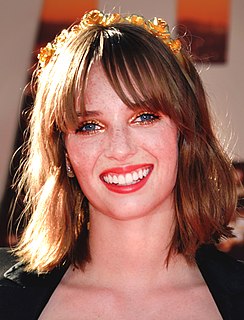A Quote by Maya Hawke
I got to take classes in writing with a fountain pen, and actually, something you make is your own textbook. So, while you're learning about something, you have to write essays on it, and then you handwrite in cursive, in fountain pen, your essays out on beautiful paper and you bind it together into a book that you hand in at the end of the course.
Related Quotes
First, consider the pen you write with. It should be a fast-writing pen because your thoughts are always much faster than your hand. You don't want to slow up your hand even more with a slow pen. A ballpoint, a pencil, a felt tip, for sure, are slow. Go to a stationery store and see what feels good to you. Try out different kinds. Don't get too fancy and expensive. I mostly use a cheap Sheaffer fountain pen, about $1.95.... You want to be able to feel the connection and texture of the pen on paper.
I used to write exclusively with one particular Montblanc fountain pen, although lately I have had to use a roller-tip fountain pen, because I find it harder and harder to control the fine muscles of my right hand during prolonged periods of work. I buy boxes of Deluxe Uni-ball pens, use them until they start to drag, and then change.
I don't even own a computer. I write by hand then I type it up on an old manual typewriter. But I cross out a lot - I'm not writing in stone tablets, it's just ink on paper. I don't feel comfortable without a pen or a pencil in my hand. I can't think with my fingers on the keyboard. Words are generated for me by gripping the pen, and pressing the point on the paper.
I write on a computer, but I've run the complete gambit. When I was very young, I wrote with a ballpoint pen in school notebooks. Then I got pretentious and started writing with a dip pen on parchment (I wrote at least a novel-length poem that way). Moved on to a fountain pen. Then a typewriter, then an electric self-correct. Then someone gave me a word processor and I was amazed at being able to fit ten pages on one of those floppy discs.
I write in pen because it works. A fountain pen is no good for writing in the way I do because I'd have to decide, each time I stopped, how long I was likely to stop for in order to know whether or not to put the cap on. But I never know. So instead, I use a ballpoint - a Montblanc, to be precise - the most comfortably balanced pen I've ever found.
People buy pads all the time, because they want to write stuff down. We're never going to get away from paper, ever. People like writing; that's why more people are writing more real thank-you notes now - not just to stand out, but because there's something about pen to paper, about holding something cool in your hands.
I feel that I'm an essayist and that my best work gets done in that form. I wanted to do a book where the essays could exist on their own terms. A book that was neither a book of essays that were shoehorned into a memoir, nor [one where] the essays had been published elsewhere first, [because] then they would kind of bear the marks of those publications.
Doubtful, but it did work... "Annabeth?" Percy said again. "You're planning something. You've got that I'm-planning-something look." "I don't have an I'm-planning-something look." "Yeah, you totally do. Your eyebrows knit and your lips press together and ---" "Do you have a pen?" she asked him. "You're kidding, right?" He brought out Riptide. "Yes, but can you actually write with it?" "I--I don't know," he admitted. "Never tried.




































